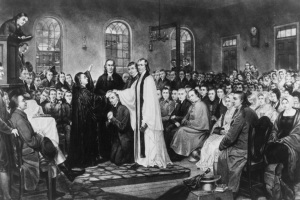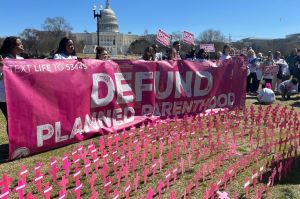The Supreme Court, Gay Parenting and Science (Part 1)
What does science say about gay parenting?
As the U.S. Supreme Court heard arguments this week in two cases involving gay marriage, some "friend of the court" briefs are asking the court to consider social science studies that supposedly confirm there is no difference in the well-being of children raised by gay couples and children raised by a mother and a father. Those studies, though, may be deeply flawed in their methodology and the conclusions drawn from their data.
"I think ... that there's substance to the point that sociological information is new. We have five years of information to weigh against 2,000 years of history or more," Justice Anthony Kennedy said during Tuesday's oral arguments for the case questioning the constitutionality of California's Proposition 8, which denied same-sex couples the right to marry.
Kennedy could have been thinking about an amicus brief filed by Professor's Leon Kass and Harvey Mansfield. There is no scientific basis to make any conclusions about what gay marriage would do for children raised by gay parents or do for society at large, Kass and Mansfield argued. They, therefore, urged the justices to rule based upon the law, not science.
Kass and Mansfield are not opposed to science. Indeed, they are themselves social scientists. Kass is the Madden-Jewett scholar at the American Enterprise Institute and Addie Clark Harding Professor Emeritus in the Committee on Social Thought at the University of Chicago. Mansfield is the William R. Kenan, Jr., Professor of Government at Harvard University. Their main concern, rather, is not that the judges will base their decisions upon science, but that they will base their decisions upon weak science, or a lack of enough science to draw conclusions.
Social scientists typically look for several factors when determining whether a study's findings offer a valuable contribution to a research question. For a quantitative study, for instance, they want to see a large number of respondents, chosen at random from the population being studied. (Random means that everyone in the population has an equal chance of being chosen for the study.) Control groups are also expected in order to tell the difference between the group being studied and everyone else. And a study's findings should be replicable, meaning that other researchers study the same research question and come to the same conclusion.
Most studies of gay parenting display few or none of these characteristics of reliable social scientific research, Kass and Mansfield point out. The studies that gay marriage proponents rely upon to argue that same-sex parents are just as good as opposite-sex parents have small non-random samples. In fact, most of data are based upon small groups of lesbian couples with above average education and higher than average levels of income.
Professor Douglas W. Allen, who teaches economics at Simon Fraser University in British Columbia, Canada, came to a similar conclusion. In a paper published last year, Allen reviewed 52 studies of gay parenting from 1995 to 2010. Most of these studies concluded that gay parents performed just as well, or better, than opposite-sex parents – a conclusion that was not warranted given the limitations of those studies, Allen found.
Besides being based upon small, non-random samples, Allen found numerous other methodological problems. One problem, for instance, was that for many of the studies the well-being of the children was determined by asking the parents. Parents, obviously, are not an objective source. This may be even more true if the parents know that their answers will be used to answer whether their lifestyle choice is the best setting for the raising of their children. One study even said that its data suggests that children in same-sex households are less susceptible to child abuse because when the study asked same-sex parents if they abused their children, they answered "no."
Some advocates of gay parenting point to the sheer number of studies showing favorable results as evidence that the science is conclusive. But, as Allen points out, a large amount of weak research does not add up to strong research: "A series of weak research designs and exploratory studies do not amount to a growing body of advanced research." Allen also points out that most of these studies are authored by a small number of researchers and many use some of the same data sets.
Allen was also struck by the amount of political advocacy he found in these research articles. The conclusions almost always made recommendations regarding gay parenting for lawyers, judges and the like, but the research did not support those recommendations. One common tactic was to report a non-finding as a finding. For instance, it might be reported that no evidence was found that children of gay parents were worse off than children of heterosexual parents. This is certainly true, but so is the corollary – no evidence was found that children of gay parents were as well off as children of heterosexual parents. Yet, the corollary was not mentioned.
Allen concluded that the "intended audience of this research is not the scientific community – which sees through it – but the community of lawyers, judges, and politicians who will, and do, decide the fates of gay and lesbian rights. If the literature on gay parenting is to rise to the standards of social science, then it has to move beyond the pre-occupation with advocacy."
The social sciences are decades away from being able to say anything conclusive about gay parenting, Kass and Mansfield point out. The reason is simple: gay parenting only recently became a widespread and socially acceptable phenomenon. So researchers are only beginning to reach a point where they can gather large, random samples that might include enough same-sex parents that they can make reliable comparisons with heterosexual parents. If such data becomes available, researchers still need to wait until the children of gay parents grow up so they can compare their well-being, using measures such as incarceration, school drop-out, suicide and college graduation rates, to the children of heterosexual parents.
While the sciences cannot say anything conclusive about gay parenting, there is a plethora of reliable scientific research on children raised in intact, biological two-parent households, and the differences between mothers and fathers in parenting. Part two of this series will look at what science says about that.





























